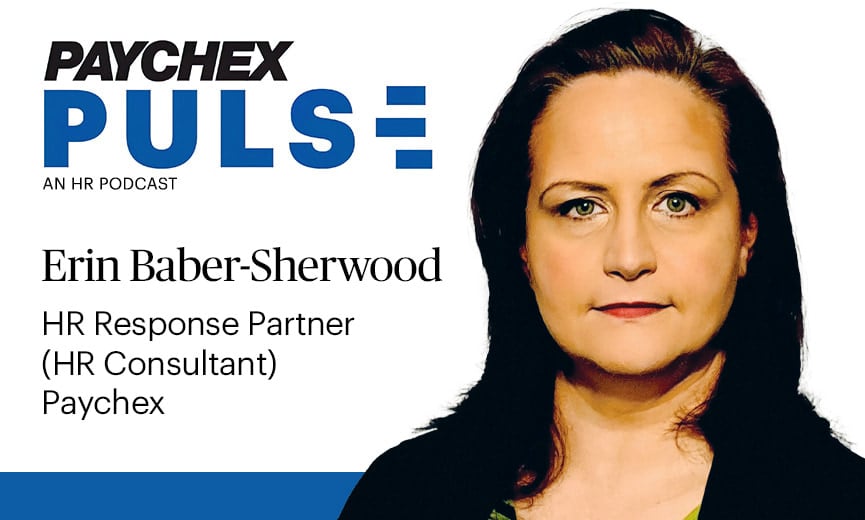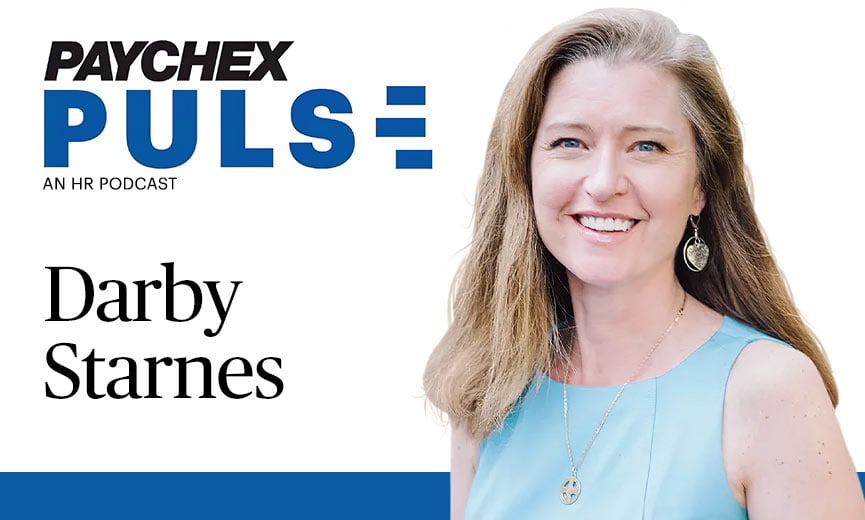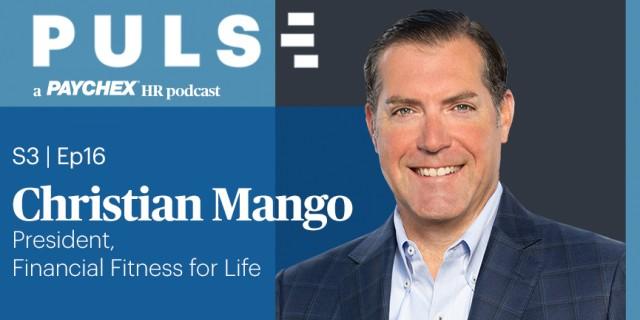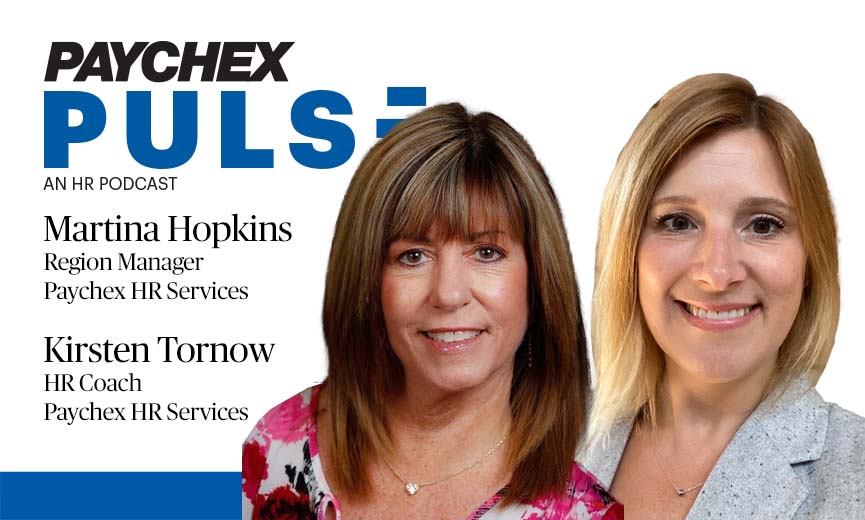The Rising Importance of AI in HR
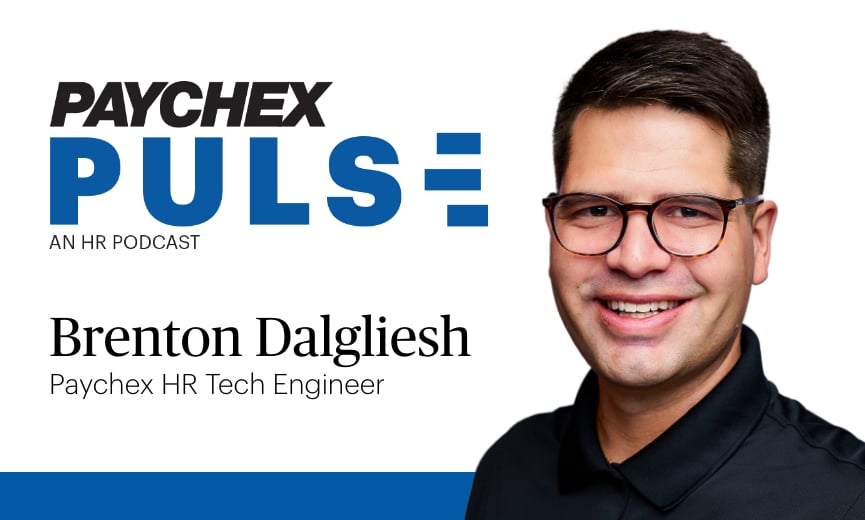
Podcast •

Watch
Summary
From talent acquisition to employee training and retention, AI is proving to be a reliable ally in HR. But just like any tool, AI's effectiveness lies in its correct application. Paychex’s very own HR tech expert, Brenton Dalgliesh, joins the podcast to discuss how you can best implement this game-changing tool. Tune in as he reminds listeners AI is not an automatic solve for all your HR challenges, instead it's about leveraging AI to enhance HR roles, streamline processes, and perhaps most importantly, to better understand and serve your people.
Topics include:
00:00 – Welcome Brenton Dalgliesh
01:22 – An overview of AI’s increasing popularity
02:17 – Understanding AI as an HR professional
03:28 – How HR professionals are using AI today
04:20 – Potential AI pitfalls
06:39 – The future of AI in HR
08:34 – The importance of conducting an AI audit
09:01 – AI and compliance issues
11:07 – The value of the HR professional
13:25 – Preparing for AI
14:39 – Wrap Up
Start preparing now for these 2024 HR technology trends.
Use this checklist to help you identify the areas where HR technology can benefit your business the most.
Paychex doesn’t just have the technology you need to help you implement AI for your HR needs, but the expert guidance that helps you optimize its benefits. Learn more.
View Transcript
Brenton Dalgliesh (00:00)
And the best way to get that going is to start conducting an AI audit today. Figure out where your gaps are within your processes and your positions and to better understand what you may need in the future, even if you're not convinced that you're going to ultimately implement AI in your business, there's no reason to not begin understanding where potential gaps are today.
Rob Parsons (00:28)
Welcome to season four of Paychex Pulse, an HR podcast where HR professionals can find great insights on today's top issues and be inspired to build and lead effective teams in a healthier workplace. Hey everyone. Rob Parsons here. Welcome back to the Paychex Pulse podcast. Our guest today is one of our very own Paychex HR professionals, Brenton Dalgliesh. For more than a decade, Brenton has been involved in all aspects of human resources, from recruiting and hiring to employee relations. He recently stepped into a new role as our first HR tech engineer, where his focus is on blending HR knowledge with HR technology. Brenton, welcome back to the podcast and congrats on the new role.
Brenton Dalgliesh (01:17)
Thanks, Rob, it's really good to be back, yeah.
Rob Parsons (01:22)
And it's actually appropriate, because today I want to talk about AI, specifically AI and HR, it is certainly a place where HR technology is blending and it's certainly become a big talking point in the industry, hasn't it?
Brenton Dalgliesh (01:39)
It really has Rob, AI is everywhere, you can't turn around whether it's the internet or TV, without running into AI. In fact, ironically, it's been around for decades, but we're coming up on the first anniversary of ChatGPT's launch here at the end of November, and so it's wild to think where we've been in the last year to where we are today. And in fact, Goldman Sachs has predicted that AI will add $7 trillion to the global economy over the next 10 years.
Rob Parsons (02:17)
So, it's not just coming, it's here. So as an HR professional, how do I stay on top of this? I know ChatGPT was the like the big one that was out there, and it was open, and it could do like everything for you. It could diagnose illnesses and write novels. How does an HR professional stay on top of all the tools that they could or should be using?
Brenton Dalgliesh (02:40)
Yeah, I would say reading, lots and lots of reading. I mean, AI can help in HR with talent acquisition, onboarding, employee training improved employee retention, improved employee health by you know, detect signs of burnout and disengagement. It's kind of interesting if you think about where we are today with where we were about 150 years ago, with the invention of the light bulb, it took 20 years for 3% of businesses to have a working light bulb and then another 20 years for 50% of businesses. So AI is here, as you just mentioned, but it's still coming, if you will.
Rob Parsons (03:28)
That's interesting. So, you know, I've got a couple questions around this, but you've mentioned a lot of areas it can help, what should I be looking at first? Where can I get the biggest bang for my buck? Or where's the technology most mature right now?
Brenton Dalgliesh (03:45)
A lot of effort or energy is being put into the hiring and recruiting space, in that regard, it's probably the most mature area for AI's involvement in HR. Candidly there are still some areas that need to be improved on, like depending on the model and how you train the model, there are opportunities for it to disqualify or exclude qualified candidates.
Rob Parsons (04:19)
I heard there's some danger too around even inadvertent discrimination and bias and bringing those things in and amplifying them when that's not your intention at all.
Brenton Dalgliesh (04:33)
Correct and I'm glad you brought that up, because AI itself doesn't discriminate, it's the model that it's trained on. I like to think of it this way. I have a couple of kids, one who's just already kindergarten a couple days ago and then a three-year-old, and they're pretty awesome kids, but like, they'll say things that I'm like "Where did you hear that from?" And then I'm thinking, well, hopefully it was TV, but it could have also been me. And so, then I'm thinking, if they're already picking up on this information, what can ChatGPT pick up on? And how much does it just reflect what already exists within our organizations?
Rob Parsons (05:19)
You know, that's an excellent point is the fact that they need to be taught, they need to learn and the old garbage in, garbage out situation, right?
Brenton Dalgliesh (05:30)
Exactly and I know from our Pulse of HR survey that almost 3/4s of all HR leaders are looking to implement AI in the next 12 months. I would caution folks to pump the brakes just a little, make sure that you are crystal clear on what you're trying to solve. AI isn't a panacea, it is awesome, but it can't do everything, and if you're trying to pigeonhole AI to solve a problem that it wasn't designed to solve for, or sometimes solutions exist that are cheaper and easier to implement such as regression analyses, those tools if you aren't aware of what you are trying to solve for you're going to be setting yourself up for a very expensive failure to put it bluntly.
Rob Parsons (06:26)
Yeah, don't find a solution and then look for a problem, right? It's like, look for the problem and then find the solution. So, as we look ahead, put on your crystal ball for a minute, look ahead, two years, three years, five years, 10 years, what do you think the biggest changes are going to come to HR because of AI? How is your profession going to change, and what kind of role is HR going to look like you know, working in partnership with AI?
Brenton Dalgliesh (06:57)
Well, I think you've nailed it there, it's got to be a partnership. Will the HR of today look like the HR of tomorrow? Absolutely not. Well let's go back to the analogy of the light bulb. It took 40 years for half of businesses to adopt it, because the infrastructure just wasn't there. And so, with AI, there's a lot of people promising a lot of great solutions, but our business models are structures. Our HR processes haven't been redesigned to mirror how AI can come in and make that change. Where we'll probably see some of the best gains is within the prediction space. AI is designed to help make better predictions. So when we stop and think about people, right? We always talk about how people are our greatest asset, but what are we doing to prove that? And so, AI will allow us to more quickly address issues before they potentially happen.
Rob Parsons (08:16)
I love that idea, that idea of anticipating problems before they become a problem, or anticipating areas where maybe I need to scale up or I need to scale down, and really being able to manage that workforce more strategically, really, that's a tremendous benefit, isn't it?
Brenton Dalgliesh (08:34)
Yeah, and the best way to get that going is to start conducting an AI audit today. Figure out where your gaps are within your processes and your positions and to better understand what you may need in the future, even if you're not convinced that you're going to ultimately implement AI in your business, there's no reason to not begin understanding where potential gaps are today.
Rob Parsons (09:01)
Is there a chance that AI becomes a compliance nightmare? And I'm thinking now beyond just the HR role, beyond the HR department, other areas in the organization, other teams using AI or the management's trying to bring AI in, that can get really complicated I would think, HR has got a role in that too, doesn't it?
Brenton Dalgliesh (09:22)
It definitely does, but when you talk about this, think like 20 or 25 years back when the internet just rolled out. I was told this was the case, so if I'm wrong, please correct me, but for a lot of organizations, the use of email was something that wasn't allowed, because businesses weren't sure how email was going to impact the organization, what content would be communicated out to other people, you know, the control portion of that compliance risk assessment, and so I think we're in that same spot all over again. I think right now there's plenty of risk and compliance definitely can be involved, but I also think we need to improve like our trust quotient with our employees. I think employees know fairly well when something is risky to put out there. And if you have an enterprise-based AI system, then it's better because your information is staying within that infrastructure, so it isn't open to the public. Someone using Bard couldn't get it, or someone looking to take advantage of Meta's new AI wouldn't be able to see that. So, I think the guardrails need to be put in place appropriately.
Rob Parsons (10:54)
Makes sense and thank you for reminding me of my age. I come back, way back when the fax machine was before the email, it was a big deal, so thanks there, Brenton, appreciate that.
Brenton Dalgliesh (11:05)
Anytime.
Rob Parsons (11:07)
Do you ever worry that bringing AI into play, AI decision making will sideline human expertise and even dare I say intuition, a gut feeling? Are we at risk of losing that, of outsourcing all of our thoughtfulness?
Brenton Dalgliesh (11:26)
It's a great question. No, I'm more concerned that we'll give away our ability to make decisions. I don't think AI will remove those on its face. AI is a tool that is designed and set up by people to solve for solutions. AI is a predicting machine. It tells you what potentially could happen. If we start taking predictions at face value, and we abdicate our right to make decisions, then that's a choice that we've made as a human race, and I don't believe that will happen. A fun example of something to this effect, Harvard Business Review did a study in the US, UK, and Germany recently, and they looked at the hiring process for a bunch of enterprises and they found that quite often qualified candidates were being just flat out rejected. And when they talked to the executives at these organizations, 88% of them were aware. So, there's a decision that needs to be made here. Are we willing to allow these kinds of processes to go unchecked or not? And I don't think we are, and AI will continue to get better as we continue to train the models, but it's incumbent upon us to understand, reevaluate, reassess and retrain the AI model.
Rob Parsons (13:07)
So, a great point, Brenton and a great way to bring this to a close, this idea of intentionality, just like we want to approach culture, we want to approach how we run our organizations, doing it on purpose and not letting things happen by accident. Any last thoughts for our audience before we close this off?
Brenton Dalgliesh (13:28)
Yeah, I think I would close with a quick quote and maybe a call to action. Arthur Clark once said, "Any sufficiently advanced technology is indistinguishable from magic." And if you think about light bulbs or internet, it's pretty clear that we may not always know how they work, but at the time that they were released, it felt like magic. And I think we're in the same place today where AI feels a little bit like magic, but it's really not. And my call to action would be...I'll use this analogy when asked to cut down a tree in six hours, I don't start cutting the tree down right away. I spend the first five hours sharpening the axe, and I think that's where we are right now. We know that a shift is coming, but we need to start preparing today. We need to clean up our data, we need to make sure that we aren't leaving things messy and inaccurate, so that way when the model is ready to learn, we can avoid bias, we can avoid discriminating against people, and we can avoid ultimately setting ourselves up for failure.
Rob Parsons (14:39)
Love it, thank you Brenton, thank you very much for joining the podcast today. This was a lot of great information.
Brenton Dalgliesh (14:45)
Thanks for having me.
Rob Parsons (14:46)
Awesome, and thank you to our listeners as well. As always, please stay happy and healthy. Be sure to subscribe to this and our Paychex Thrive Business podcast on your favorite podcast platform. Looking for more ways to keep your finger on the pulse of industry dynamics, visit our resource center for the latest research, thought leadership and news at paychex.com/works, that's W-O-R-X. Thanks again for joining us, until next time, please stay happy and healthy.
Announcer (15:19)
This podcast is Property of Paychex Incorporated 2023, all rights reserved.

 Apple Podcast
Apple Podcast Spotify
Spotify iHeartRadio
iHeartRadio
